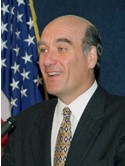
Reaction to FTC Report Opposing Privacy Legislation
(July 15, 1999) The FTC's July 13 report which opposed enactment of any new online privacy laws at this time has been commended by the administration, and industry groups, but criticized by privacy groups and legislators seeking to pass online privacy bills.
"I am very disappointed by the FTC's recent report to Congress on privacy," said Sen. Conrad Burns (R-MT) in a press release. "The report acknowledges that less than 10 percent of websites meet all basic privacy protections, but the report calls for no federal legislation to address this situation."
| Related Pages |
| TLJ Summary of Online Privacy
Bills. S 809, Online Privacy Protection Act. |
Sen. Burns is sponsoring a bill, along with Sen. Ron Wyden (D-OR), that would require web sites and online services to post notices about their information collection and use policies, and allow individuals to prevent disclosure of personal information. S 809 IS, the Online Privacy Protection Act, was introduced on April 15, 1999. Sen. Burns would like the Commerce Committee to hold a hearing on the bill before the August recess.
 |
|
| Sen. Burns |
"As the communications revolution alters every aspect of our personal and economic lives, now is no time for inaction," Sen. Burns said. "I will continue to move forward with Senator Wyden on this critical issue, so that consumers have confidence in the safety of their personal information in the digital age."
"I can't imagine that the FTC thinks consumers should be subjected to a privacy potluck, but that's what the Georgetown study demonstrates is the case for the foreseeable future," said Sen. Wyden.
"Chairman Burns and I worked hard to fight discriminatory taxes on e-commerce, and we just don't want to see the privacy issue erase the progress the e-marketplace has now achieved," Wyden said.
 |
|
| Wm. Daley |
In contrast, Secretary of Commerce William Daley commended the FTC's. The Commerce Department has long supported industry self regulation of online privacy.
"I am pleased with the FTC's report to Congress and strongly support its decision to give self-regulation a chance" said Daley. "I agree with Chairman Pitofsky's belief that self regulation is the least intrusive and most efficient means to ensure fair information practices online at this time."
Daley also supported the FTC's efforts to continue to monitor industries' progress. "Posting a privacy policy is not enough" said Daley. "It must be a comprehensive policy that provides the consumer with notice, choice, security, access and mechanisms for recourse. Obviously, for self-regulation to succeed, continuous progress must be made in achieving wide-spread adoption of strong privacy protection."
The Electronic Privacy Information Center (EPIC) made the following statement about the FTC report. "The Commission put great weight on a recent study which found that two-thirds of web sites posted a notice concerning privacy. It didn't seem to interest the Commission that these notices typically tell people that personal information is collected without restriction, and provide no limitation on use, no rights of access, no redress for harm, nor any of the other basic elements of Fair Information Practices. Privacy advocates and consumer organizations were uniformly disappointed by the FTC report." EPIC is a non profit group based in Washington DC.
In contrast, computer and Internet industry groups praised the FTC report.
Lauren Hall, CTO of the Software & Information Industry Association (SIIA) stated in a press release that "Businesses and industry groups understand that in order for electronic commerce to grow, consumers must feel that their personal information will remain secure. The incentives for businesses to provide online privacy policies are clear, and industry has responded appropriately and swiftly in recent months. SIIA is leading educational efforts through our Online Privacy seminars to help businesses implement credible privacy policies."
"Companies like Microsoft and IBM are taking the lead by not advertising on Web sites that do not have adequate privacy policies and industry groups like the Online Privacy Alliance (OPA), BBBOnline (a service of the Better Business Bureau), and TRUSTe are making dramatic improvements according to the FTC report. SIIA feels that the FTC has made the right and prudent choice not to recommend legislation at this time," said Hall.
SIIA was formed earlier this year through the merger of the former Software Publishers Association (SPA) and the Information Industry Association (IIA).
Likewise, "The Business Software Alliance (BSA) is pleased," said Robert Holleyman, BSA President. "A Georgetown University study released in May showed that 94 percent of the Top 100 most visited web sites have posted privacy policies. As a member of the Online Privacy Alliance (OPA), the BSA would like to think that the efforts of OPA over the past year lead to this impressive result and improvement."
Holleyman added that, "Most important, however, the FTC study emphasizes that at this time of rapid development of the Internet and technological change, that self-regulation - not federal legislation - is the best way to ensure fair practices online."
| Related Stories |
| Burns and Wyden Introduce Online Privacy Bill,
4/18/99. FTC Opposes Online Privacy Legislation, 7/13/99. House Subcommittee Holds Hearing on Online Privacy, 7/14/99. |